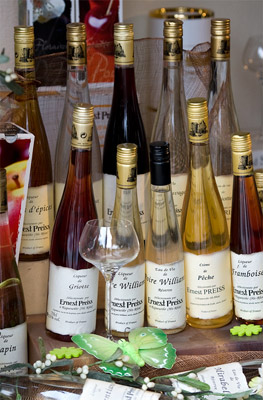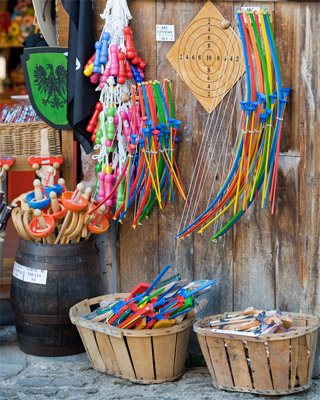< Introducing Western France
Shopping

Selection of fruit liqueurs displayed for sale
Going shopping in France tantalizes the senses. From chocolates to perfumes, speciality foods and wines to fashionable clothing, “Made in France” signifies quality. Leisurely shopping can be a challenge with children, but even they will enjoy exploring the fresh and varied goods on offer at the colourful outdoor markets. Check out the flea markets for a special memento that is distinctly French.
Opening hours
The big chain stores usually remain open all day, but most other shops in France, especially those outside big cities, still take a break for lunch. Shops open sometime between 8 and 10am, close at noon or 12:30pm for lunch, and reopen from around 2–3pm until 6–7pm; (some later in summer). Most shops, except supermarkets, are closed on Monday.Some supermarkets and shops do open on Sunday morning, however.
Supermarkets
Almost everything is available in the large, modern and well-stocked supermarchés and hypermarchés such as Carrefour, Leclerc, Monoprix, Intermarché and Super U found on the outskirts of all the major towns and cities. Some of the world’s best breads and pastries can easily be bought from the local boulangerie or pâtisserie; select from a wide range of cheese at the local fromagerie. Chocolate lovers should try out the many artisan chocolatiers who make their own creations. Intermarché, Carrefour, Super U, Monoprix and Leclerc.
Markets
The best source for food and a must-try experience is the weekly market, whether it is on a city street or in a central village square. Most big towns have a permanent covered market halle, which is usually open six days a week. Contact the tourist office for details. An outdoor market opens around it one or more days a week and is regarded as a social event. Look out for special farmers’ markets (marchés paysans) in the summer; these are often held on Sunday mornings. Wine touring is very popular among those who visit France’s many wine regions. Pick up bottles at rates often lower than in the shops. At smaller vineyards, guests are welcome to sample a glass and have a chat.
Once a month or so, a local market may expand into a big affair, selling clothes, pots and pans, cowbells or even tractors.
Find an odd memorable souvenir at an antique market or at a flea market (marché aux puces). Look for the posters announcing vide greniers (a kind of attic sale). These can be great fun for kids; the most astonishing things can come out of an old French attic, including an amazing array of toys.

Colourful toys and souvenirs on a street in Conques
Marché aux Puces de St Ouen
www.marcheauxpuces-saintouen.com
Clothes and accessories
The French love their department stores, but in provincial towns, the best shopping is in the small and independent boutiques. Everyday items can be purchased at the many national chains and supermarkets such as Auchan, Monoprix, Géant Casino and Carrefour. For these, look out for signs to a Centre Commercial.
Books, music, art and crafts
It is fairly easy to find at least a small selection of books (these are mostly bestsellers) in English in bookstores or newsstands. The FNAC chain has branches in many cities and is ideal for browsing and picking up books, music and electronics.
Artists, woodcarvers, glassmakers and craftsmen of all kinds congregate in summer, selling their creations from their studios or at local markets. Check online national directories and at the tourist offices for details.
FNAC
www.fnac.com
Sales tax and refunds
Non-European Union residents can claim back 12 per cent of the 19.6 per cent TVA (sales tax) as long as they spend over €175 in a single day in a single participating shop; there will be a “Tax Free” sign. Ask for a tax refund cheque (bordereau de détaxe) to present at customs.
Shopping centres
www.centres-commerciaux.com
Wines and farm products
www.marchesdepays.fr


